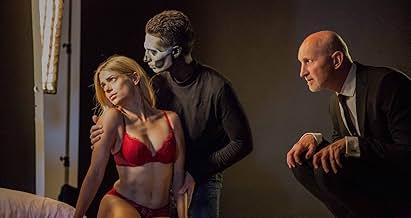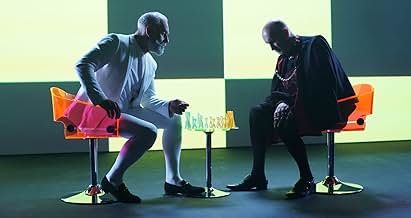El pródigo científico y emprendedor tecnológico, Dr. Faust, busca emular la capacidad de Dios para crear vida. Vende su alma al diablo para realizar su mayor ambición: crear el primer super-... Leer todoEl pródigo científico y emprendedor tecnológico, Dr. Faust, busca emular la capacidad de Dios para crear vida. Vende su alma al diablo para realizar su mayor ambición: crear el primer super-humano del mundo.El pródigo científico y emprendedor tecnológico, Dr. Faust, busca emular la capacidad de Dios para crear vida. Vende su alma al diablo para realizar su mayor ambición: crear el primer super-humano del mundo.
Yvonne Mai
- Gretchen
- (as a different name)
- …
Argumento
Reseña destacada
First of all, I must declare an interest, as I am in this movie, so obviously I am very partial; but that doesn't mean to say that I have nothing useful to say about it.
Here goes:
If you judge this film against the standards of the usual product of Hollywood or Netflicks, etc., it has to be admitted that it looks odd by comparison. But then this is not your average movie: not by any means. It has a narrative - two if you count the framing story where Steven Berkoff as Dr Goodfellow tells the story of Faust to the artificial man Homunculus - and it encompasses the whole arc of Goethe's massive two part play version. But it is scrunched down to emblematic mini-scenes. Why? Because the progenitor of this film, Philipp Humm, is a painter/sculptor, and his sensibility is primarily visual, so, as in his static art, he is trying to convey his vision in condensed visual form.
That is not to say that we have some kind of dull animated tableaux here. There are two things that principally keep this film alive and kicking. The first is the sheer fertility of Philipp Humm's imagination. It is hard to keep up with the wealth and variety of the imagery on display here, and the layered meanings that that are intended. You have to watch it expecting to be challenged.
The second enlivening thing is the humour. It is ironic and bone-dry. If, watching it, you find yourself thinking: "Is that meant to be funny", the answer will always be yes.
Yet it can also be harrowing. There is, yes, a Brechtian thing going on here. You are meant to examine and interpret and judge. Does it matter that when Faust and Mephisto fly (which was uncomfortable but fun, by the way) you can see the strings? It was intended all along. I was present when it was discussed. Why? Well, if God exists, and he appears as a character here, aren't we all puppets?
And, once you get the hang of it, it is quite easy to work out what s being said here. The sun as a a naked breast? An incidental comment on society's ongoing fetishising of breasts. The devil as a hedge-fund manager? The "root of all evil" laid bare.
Philipp has said he wants to "democratise" Goethe, so he wants his references easily accessible, and they are. It is a glorious game for him. He has hijacked Goethe, perhaps, but out of love for him and belief in what he has to say, and so has offered this new view as if through a kaleidoscope.
As for me, I had a blast making it, and it will always be an experience that I look back on with pleasure.
One other thing: mad as this film may seem, Philipp Humm is very far from the stereotype of the crazy artist. He is quiet, humane, modest and very sane. So, like it or not, there is nothing accidental here. Take this film on its own terms, if you care to take it at all. And it is intended as a warning, so it is worth listening to for that alone.
- glyndilley
- 16 dic 2019
- Enlace permanente
Selecciones populares
Inicia sesión para calificar y añadir a tu lista para recibir recomendaciones personalizadas
Detalles
- Duración1 hora 47 minutos
- Color
Contribuir a esta página
Sugerir un cambio o añadir el contenido que falta

Principal laguna de datos
By what name was The Last Faust (2019) officially released in Canada in English?
Responde



















